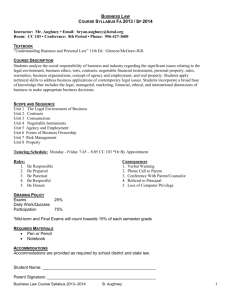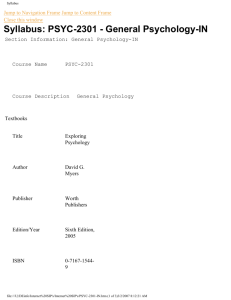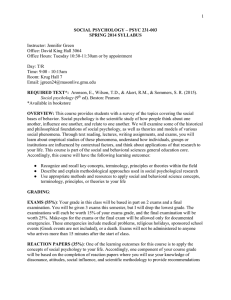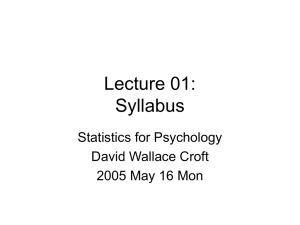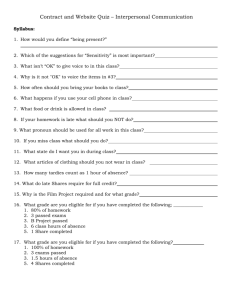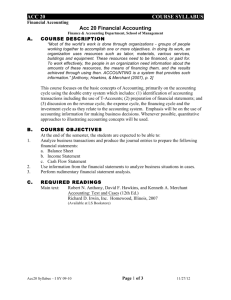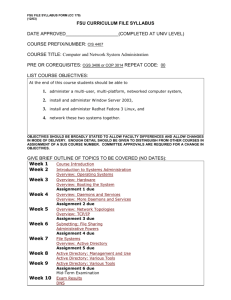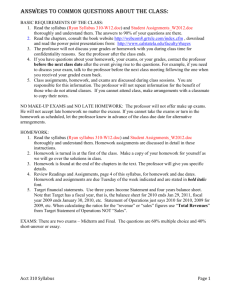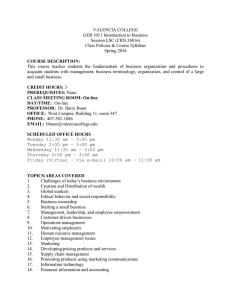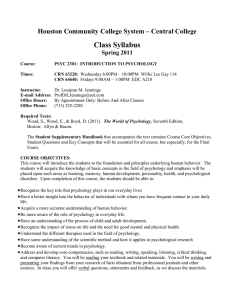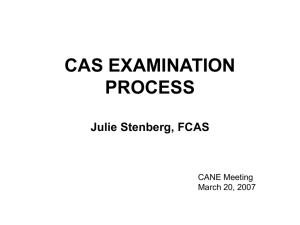Psychology 435 Syllabus: Personnel Training and Development
advertisement
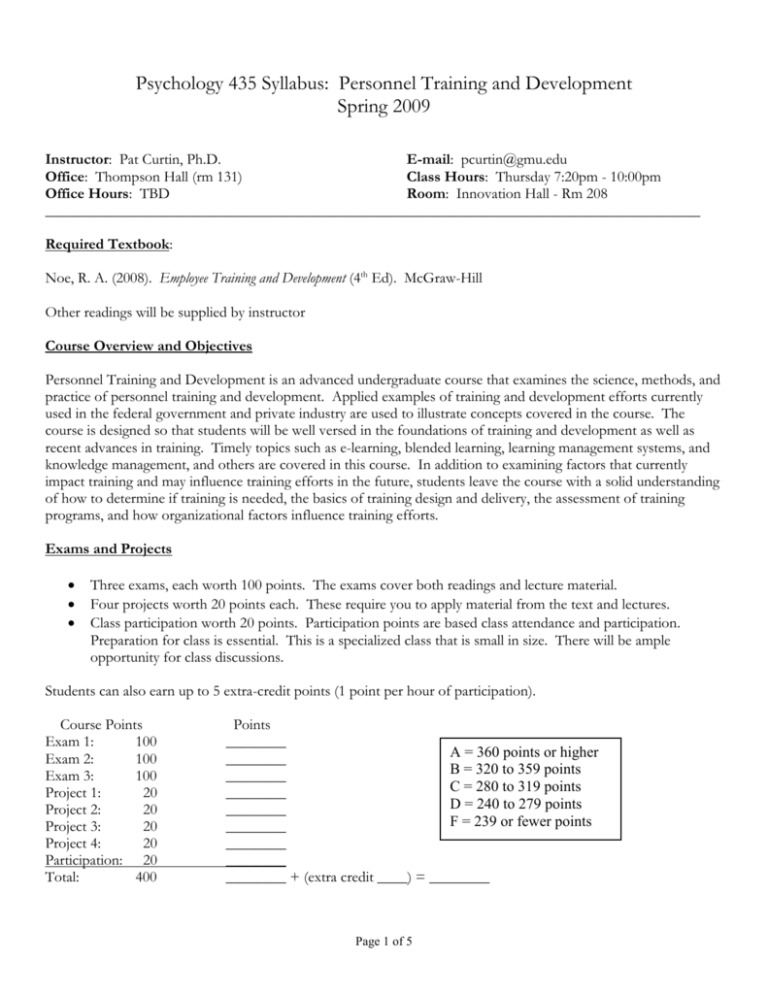
Psychology 435 Syllabus: Personnel Training and Development Spring 2009 Instructor: Pat Curtin, Ph.D. E-mail: pcurtin@gmu.edu Office: Thompson Hall (rm 131) Class Hours: Thursday 7:20pm - 10:00pm Office Hours: TBD Room: Innovation Hall - Rm 208 _______________________________________________________________________________________ Required Textbook: Noe, R. A. (2008). Employee Training and Development (4th Ed). McGraw-Hill Other readings will be supplied by instructor Course Overview and Objectives Personnel Training and Development is an advanced undergraduate course that examines the science, methods, and practice of personnel training and development. Applied examples of training and development efforts currently used in the federal government and private industry are used to illustrate concepts covered in the course. The course is designed so that students will be well versed in the foundations of training and development as well as recent advances in training. Timely topics such as e-learning, blended learning, learning management systems, and knowledge management, and others are covered in this course. In addition to examining factors that currently impact training and may influence training efforts in the future, students leave the course with a solid understanding of how to determine if training is needed, the basics of training design and delivery, the assessment of training programs, and how organizational factors influence training efforts. Exams and Projects Three exams, each worth 100 points. The exams cover both readings and lecture material. Four projects worth 20 points each. These require you to apply material from the text and lectures. Class participation worth 20 points. Participation points are based class attendance and participation. Preparation for class is essential. This is a specialized class that is small in size. There will be ample opportunity for class discussions. Students can also earn up to 5 extra-credit points (1 point per hour of participation). Course Points Exam 1: 100 Exam 2: 100 Exam 3: 100 Project 1: 20 Project 2: 20 Project 3: 20 Project 4: 20 Participation: 20 Total: 400 Points ________ A = 360 points or higher ________ B = 320 to 359 points ________ C = 280 to 319 points ________ D = 240 to 279 points ________ F = 239 or fewer points ________ ________ ________ ________ + (extra credit ____) = ________ Page 1 of 5 Missed Deadlines All projects are due on the assigned date. Two points will be subtracted for every day a project is late. Note that computer problems are not valid excuses for late projects. This means that, if a project is not completed because a “computer crashed” the night before a project is due, it is still considered late. You must plan ahead to make sure the assignments will be completed on time, or turned in early if you must be absent for some extreme emergency. I do not accept projects by email. It is extremely important for you to be present for the exams. If some extreme event requires you to miss an exam (for example, parent undergoing extensive surgery), you must talk to me about missing the exam before the scheduled exam date. If you do not meet with me before missing the exam, no make-up exam will be given. The only exception will be for a medical or family emergency, and you must have documented proof of the emergency. Furthermore, you must inform me of the emergency within one week of the regular exam date. Absolutely no deviations from this policy will be tolerated. Although this policy may seem tough, it is the only fair way to treat all class members. Everybody will receive the same treatment, and there will be no exceptions. The reason you know exactly when projects are due is so that you can plan accordingly to be sure they are completed on time. Requests for Reconsidering a Grade If you feel that a paper or other work you submitted was improperly evaluated, you can ask to have it reviewed and the grade reconsidered. To do this, prepare a typed statement (one or two paragraphs) explaining what you believe to be erroneous about the grade. – be specific. While I am unreceptive to being asked to review work simply because a poor grade was received, I appreciate the opportunity to correct a mistake. Honor Code Violations of the student honor code (e.g., plagiarism, cheating) will be reported to the Psychology Department and dealt with according to university policy. No exceptions. Students with Disabilities If you are a student with disability and you need academic accommodations, please see me and contact the Disability Resource Center (DRC) at 709-993-2474. All academic accommodations must be arranged through the DRC office. Any accommodations must be arranged for well in advance of exams or other relevant class activities. Lecture Notes Currently, I do not plan to post lecture notes on WebCT. If I eventually do post lecture notes, the postings will be in outline format. The purpose of outlines will be to facilitate class discussion and to serve as study aids. Therefore, class attendance and good note taking on your part is essential to performing well. Other Last day to add: February 4th (per changes made to Spring 2009 Academic Calendar released 01/13/09) Last day to drop: February 20 Page 2 of 5 Course Schedule Note: Dates are subject to change if necessary. Any revisions to this syllabus will be announced during class time. It is your responsibility to make note of any changes in this syllabus. Date Topic January 22 Syllabus review and Chapter 1 - Introduction to Training & Development January 29 Chapter 2 - Strategic Training February 5 Chapter 3 - Needs Assessment February 12 Chapter 4 - Learning: Theories and Program Design February 19 EXAM 1 February 27 Chapter 5 - Transfer of Training March 5 Chapter 6 - Training Evaluation March 12 Spring Break Chapter 7 - Traditional Training Methods March 26 Chapter 8 - E-Learning and Use of Technology in Training EXAM 2 (SIOP) Chapters 1-4 No Class Chapters 5-8 Project 3 Due April 9 Chapter 9 - Employee Development April 16 Chapter 10 - Special Issues in Training and Development April 23 Chapter 11 - Careers and Career Management April 30 Chapter 12 - Special Challenges in Career Management and Chapter 13 - Future of Training and Development May 7 Project 1 Due Project 2 Due March 19 April 2 Notes FINAL EXAM (7:30-10:15 PM) Page 3 of 5 Project 4 Due Chapters 9-13 PROJECTS **** All papers are to be written in 12 point font and double spaced *** Project 1 (Due February 12) Using your own experience or some other source, describe or select an employee training program. Write a two page paper that includes the following: 1. A brief description of the training program 2. Your source (Own experience, Internet) 3. Identify which theory of learning this training program is based upon and explain why you think this training is based on this theory. 4. Explain why you think this training would be effective or ineffective (base this analysis on the readings and our class discussions). Project 2 (Due March 5) Explain how you would go about evaluating the training program you described in project 1. The paper should be 2 to 4 pages typed and include the following: 1. A brief description of the training program (you can just use the description you gave in project 1). 2. An explanation of how you would evaluate the training program. Be sure to include: A description of the sample you would use and why. The outcome you would use to evaluate the training program (and how you would measure this outcome). A description of the design of your evaluation study and why you chose this design 3. List at least one threat to the validity of your study and explain why this is a threat. Project 3 (Due April 9) The purpose of this project is to introduce you to some of the basic research in the area of employee training and development. I am asking that you review one research paper on any of the topics addressed in this course written in one of the following journals since 1995: Journal of Applied Psychology Personnel Psychology Academy of Management Journal Organizational Behavior and Human Decision Processes Write a two to four page review of this paper. Your review should contain at least the following elements: 1. Full citation to the article. 2. A brief description of the purpose of the article. 3. What the author found and how she/he interprets their findings. 4. How it relates to the course content covered in this class--does it add to your knowledge, contradict or support or add to what was said in class or in the textbook? 5. Any weakness you saw in the article – that is the project/work of the author(s) 6. What you found confusing or did not understand about the article. ATTACH A COPY OF THE PAPER YOU REVIEWED TO YOUR PAPER!! Page 4 of 5 Project 4 (Due April 30) You are an Industrial/Organizational Psychologist within the FBI. The FBI is planning to hire a large number of new Special Agents in the next 3 years. In May, you are charged with developing a training program that will prepare mid-level Special Agents to serve on interviewing panels. You have to conduct your first training session no later than June and interviewers need to be ready to serve on panels by the end of September. To meet the hiring goals for the next fiscal year (Oct to Oct), it is estimated that you will need to have at least 90 trained interviewers ready by September. You will need to train Special Agents from across the country as the applicant interviews will be conducted in numerous field offices around the U.S. Considering all of these requirements and limitations, how would you address the following? 1. What method or methods would you use to train these individuals? Use methods listed in Chapters 7 & 8 for examples. Explain why you chose a particular approach. For example, why would it be the most effective method, or most practical, or most likely to ensure timelines and project goals are achieved? If more than one method is appropriate, explain why. 2. Describe your training in as much detail as you can. Address at least the following: a. Length of training (i.e., days) b. Training content – create an agenda or syllabus if you like (simple one) i. List – lecture topics, exercises, etc. 3. How would you ensure that the Special Agents would actually be qualified to serve as interviewers when they complete their training? That is, how would you maximize learning and transfer of training? Use the model of the transfer process to guide your answer, address each of the key features of the model. Write a two to five page concept paper that addresses the questions above. Training Links: http://www.astd.org http://www.siop.org http://www.ipma-hr.org Syllabus developed by referencing: Holtz (Spring - 2005), Vierra (Fall - 2004), Ployhart (Spring – 2001) Page 5 of 5
